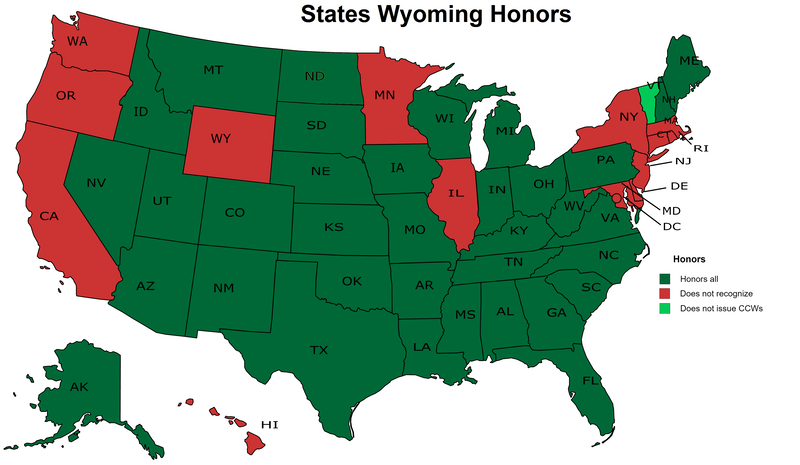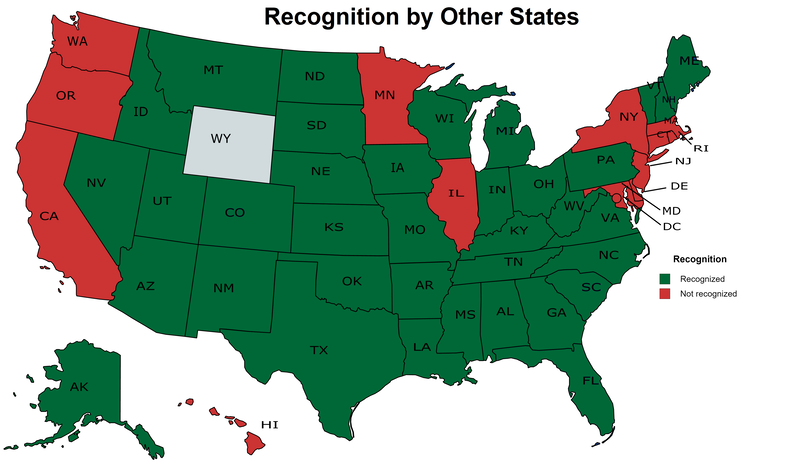
Weapon Laws Title 6, Ch. 8
Wyoming does not have any form of pistol/firearm licensing, gun registration, an assault weapons ban or magazine restrictions. There is no waiting period mandated for firearm purchases and private gun sales are legal. Concealed firearm permits are shall-issue and anyone may carry concealed without a permit. Open carry is legal, does not require a permit, and is less regulated than concealed carry is.
Wyoming does not have any form of pistol/firearm licensing, gun registration, an assault weapons ban or magazine restrictions. There is no waiting period mandated for firearm purchases and private gun sales are legal. Concealed firearm permits are shall-issue and anyone may carry concealed without a permit. Open carry is legal, does not require a permit, and is less regulated than concealed carry is.

Prohibited Locations (public buildings) 6-5-209
You may not take a firearm (openly or concealed) into a jail, a state penal institution, the Wyoming boys' school, Wyoming girls' school, or a private correctional facility, the state hospital, or a courtroom. Judges may carry a concealed firearm in their courtroom and may grant others permission to carry a concealed weapon in their courtroom.
You may not take a firearm (openly or concealed) into a jail, a state penal institution, the Wyoming boys' school, Wyoming girls' school, or a private correctional facility, the state hospital, or a courtroom. Judges may carry a concealed firearm in their courtroom and may grant others permission to carry a concealed weapon in their courtroom.

State Capitol WAC 006-041-006 (Sec. 2)
No dangerous weapon may be carried in the State Capitol building or in any capitol complex buildings. Police are authorized to request that any persons carrying a dangerous weapon in any state building relinquish and check the weapon. If a person carrying a dangerous weapon refuses to relinquish the weapon, they will be denied access to the capitol.
No dangerous weapon may be carried in the State Capitol building or in any capitol complex buildings. Police are authorized to request that any persons carrying a dangerous weapon in any state building relinquish and check the weapon. If a person carrying a dangerous weapon refuses to relinquish the weapon, they will be denied access to the capitol.
6-8-104(t) Where concealed firearms are prohibited
"No person authorized to carry a concealed weapon pursuant to paragraphs (a)(ii) through (iv) of this section shall carry a concealed firearm into:
- Any facility used primarily for law enforcement operations or administration without written consent;
- Any detention facility, prison or jail;
- Any courtroom, except judges can determine who may carry a concealed weapon;
- Any meeting of a governmental entity;
- Any meeting of the legislature or a committee thereof;
- Any school, college or professional athletic event not related to firearms;
- Any portion of an establishment licensed to dispense alcohol for consumption on the premises, which portion of the establishment is primarily devoted to that purpose (bars and bar areas);
- Any place where persons are assembled for public worship, without written consent;
- Any elementary or secondary school facility;
- Any college or university facility without the written consent of the security service;
- Any place where the carrying of firearms is prohibited by federal law or regulation or state law.

Schools, colleges/universities
Wyoming has no other laws prohibiting where firearms cannot be openly carried, including schools, and colleges. Open carry is not regulated except at the state capitol, courts, mental health and correctional institutions. Schools, universities, and government employers may regulate their employees and students behavior under threat of discipline or termination/expulsion. K-12 students may be expelled for bringing a firearm onto campus, 21-4-305(a). College/university students should check their campus's policies or student code.
There is no law prohibiting open carry by parents/adults at a school or by non-students on a college/university campus. Use caution, however, as you may be harassed by staff and law enforcement.
Wyoming has no other laws prohibiting where firearms cannot be openly carried, including schools, and colleges. Open carry is not regulated except at the state capitol, courts, mental health and correctional institutions. Schools, universities, and government employers may regulate their employees and students behavior under threat of discipline or termination/expulsion. K-12 students may be expelled for bringing a firearm onto campus, 21-4-305(a). College/university students should check their campus's policies or student code.
There is no law prohibiting open carry by parents/adults at a school or by non-students on a college/university campus. Use caution, however, as you may be harassed by staff and law enforcement.
Can I carry a gun near a school? Don't I have to be 1000 feet away?
This is a federal law that is not enforced by Wyoming law enforcement and there is no applicable similar Wyoming law (unlike some states). You generally will not be prosecuted unless you are doing something else illegal, such as involved in gang activity or drug violations, that interest federal law enforcement. The law was intended to apply to drug dealers and gang members, not the law abiding citizen.
The Gun-Free School Zones Act of 1990 basically states that one cannot "knowingly to possess a firearm [...] in "a school zone." 'School zone' is defined as "in, or on the grounds of, a public, parochial or private school; or (B) within a distance of 1,000 feet from the grounds of a public, parochial or private school." It includes all public roads and sidewalks within that 1,000 foot buffer zone. It does not apply on private property, to a licensed concealed firearm permittee (state law does prohibit guns on campuses except with written authorization), or an unloaded weapon in a locked container/rack.
The law was found unconstitutional in its original version, so, to skirt the constitutional issue, the language was altered to say that it was a matter of 'interstate commerce' as all guns have moved in interstate travel as part of manufacturing and shipping and thus under the authority of Congress.
This is a federal law that is not enforced by Wyoming law enforcement and there is no applicable similar Wyoming law (unlike some states). You generally will not be prosecuted unless you are doing something else illegal, such as involved in gang activity or drug violations, that interest federal law enforcement. The law was intended to apply to drug dealers and gang members, not the law abiding citizen.
The Gun-Free School Zones Act of 1990 basically states that one cannot "knowingly to possess a firearm [...] in "a school zone." 'School zone' is defined as "in, or on the grounds of, a public, parochial or private school; or (B) within a distance of 1,000 feet from the grounds of a public, parochial or private school." It includes all public roads and sidewalks within that 1,000 foot buffer zone. It does not apply on private property, to a licensed concealed firearm permittee (state law does prohibit guns on campuses except with written authorization), or an unloaded weapon in a locked container/rack.
The law was found unconstitutional in its original version, so, to skirt the constitutional issue, the language was altered to say that it was a matter of 'interstate commerce' as all guns have moved in interstate travel as part of manufacturing and shipping and thus under the authority of Congress.

Can I carry in a bar? Can I drink while armed?
You may not carry a loaded firearm ("with a cartridge therein") or hunt while intoxicated or under the influence of a controlled substance, 23-3-307 (a hunting regulation, but nonetheless applicable). You can openly carry a firearm in a bar or restaurant, though concealed firearms are more strictly regulated. 6-8-104(t)(vii) prohibits concealed carry only in "any portion of an establishment licensed to dispense alcoholic liquor and malt beverages for consumption on the premises, which portion of the establishment is primarily devoted to that purpose." This would define bars and bar areas of restaurants, but not the main dining areas of restaurants.
You may not carry a loaded firearm ("with a cartridge therein") or hunt while intoxicated or under the influence of a controlled substance, 23-3-307 (a hunting regulation, but nonetheless applicable). You can openly carry a firearm in a bar or restaurant, though concealed firearms are more strictly regulated. 6-8-104(t)(vii) prohibits concealed carry only in "any portion of an establishment licensed to dispense alcoholic liquor and malt beverages for consumption on the premises, which portion of the establishment is primarily devoted to that purpose." This would define bars and bar areas of restaurants, but not the main dining areas of restaurants.

Car carry, home/business carry
Concealed carry is prohibited in a vehicle (no distinction is made by the law), but open carry and loaded rifles/shotguns is not regulated. There also is no exemption for home or business concealed carry. Generally, a homeowner, private property owner, or businessman is not interfered with for open carry.
Concealed carry is prohibited in a vehicle (no distinction is made by the law), but open carry and loaded rifles/shotguns is not regulated. There also is no exemption for home or business concealed carry. Generally, a homeowner, private property owner, or businessman is not interfered with for open carry.

Do 'no guns' signs have the force of law?
There is no law prohibiting guns in places posted 'no guns.' Failure to leave or disarm when requested to do so would be a trespassing violation, 6-3-303:
There is no law prohibiting guns in places posted 'no guns.' Failure to leave or disarm when requested to do so would be a trespassing violation, 6-3-303:
(a) A person is guilty of criminal trespass if he enters or remains on or in the land or premises of another person, knowing he is not authorized to do so, or after being notified to depart or to not trespass. For purposes of this section, notice is given by:
(i) Personal communication to the person by the owner or occupant, or his agent, or by a peace officer; or
(ii) Posting of signs reasonably likely to come to the attention of intruders.
This section would have to be liberally applied to allow a sign banning a particular behavior, carrying a firearm, to constitute trespassing. Common understanding of the law in Wyoming a 'no guns' sign is a request and a verbal warning by security or the property owner/management is the warning that must be heeded to avoid a violation. A guest or patron of a public business is not an intruder. Frontier Carry is not aware of any case law or legislative intent regarding firearms and this section.
Federally Prohibited Places

Firearms, loaded or unloaded, concealed or openly carried, are prohibited in the following places
Interstate Transportation Protection 18 USC § 926A
This section was intended to protect innocent passage of travelers who might have a firearm prohibited by local jurisdiction. For instance, a resident of a frontier state driving through California with an 'assault weapon' to another free state. The trip must be from one free state to another, the firearm unloaded, and neither the firearm nor any ammunition is readily accessible from the passenger compartment. In the case of a vehicle without a compartment separate from the driver’s compartment the firearm or ammunition shall be contained in a locked container other than the glove compartment or console.
Airports/Aircraft 49 CFR 1540.111 and 49 USC § 46505
Under federal law (local laws may differ), firearms are prohibited beyond the TSA checkpoints. You also cannot attempt to enter a TSA checkpoint while armed, even by mistake. Check your bags! Even loose ammunition, empty magazines, spent cases, and miscellaneous gun parts have caused problems and prosecutions for travelers. Learn more about the TSA regulations.
Military Bases
Self-defense firearms are generally prohibited on base. Almost uniformly, civilians may not possess firearms on base. Service-members may be required to store their weapons as their commanding officer directs. Check individual base and service branch regulations.
National Parks
Section 512, Credit CARD Act of 2009 (and 54 USC § 104906) changed federal law to make park firearm regulations reflect state law. Typically, the only restrictions on firearm carry are state and local laws. If it is legal elsewhere in the state, it is legal in the park and sections that conflict with state law regarding carrying and possessing firearms (but not shooting bans) do not apply. So though on National Park Service lands (National Parks, Monuments, etc.) carrying a firearm or possessing loaded firearms are prohibited in vehicles (unless one has a special park permit, usually for hunting), this does not apply if the state allows open and/or concealed carry, or loaded/unloaded firearms in vehicles.
The park buildings (visitor centers, offices, etc.) are still federal facilities and off-limits to firearms. Discharge of firearms, except when lawfully hunting, is generally prohibited. Discharge of firearms, except when lawfully hunting, is generally prohibited. The same applies for National Wildlife Refuges, 16 USC § 1a–7b.
National Forest and Bureau of Land Management (BLM) lands in Wyoming have no ban on the carry of firearms.
- Inside federal facilities (including courthouses and offices like a Social Security office);
- On military bases (military personnel should refer to DoD policy and post orders regarding storing personal weapons on base);
- The Post Office property (includes the parking lot), but not post-office windows in stores (contract stations);
- VA hospitals/facilities including federal veterans' cemeteries (carrying).
Interstate Transportation Protection 18 USC § 926A
This section was intended to protect innocent passage of travelers who might have a firearm prohibited by local jurisdiction. For instance, a resident of a frontier state driving through California with an 'assault weapon' to another free state. The trip must be from one free state to another, the firearm unloaded, and neither the firearm nor any ammunition is readily accessible from the passenger compartment. In the case of a vehicle without a compartment separate from the driver’s compartment the firearm or ammunition shall be contained in a locked container other than the glove compartment or console.
Airports/Aircraft 49 CFR 1540.111 and 49 USC § 46505
Under federal law (local laws may differ), firearms are prohibited beyond the TSA checkpoints. You also cannot attempt to enter a TSA checkpoint while armed, even by mistake. Check your bags! Even loose ammunition, empty magazines, spent cases, and miscellaneous gun parts have caused problems and prosecutions for travelers. Learn more about the TSA regulations.
Military Bases
Self-defense firearms are generally prohibited on base. Almost uniformly, civilians may not possess firearms on base. Service-members may be required to store their weapons as their commanding officer directs. Check individual base and service branch regulations.
National Parks
Section 512, Credit CARD Act of 2009 (and 54 USC § 104906) changed federal law to make park firearm regulations reflect state law. Typically, the only restrictions on firearm carry are state and local laws. If it is legal elsewhere in the state, it is legal in the park and sections that conflict with state law regarding carrying and possessing firearms (but not shooting bans) do not apply. So though on National Park Service lands (National Parks, Monuments, etc.) carrying a firearm or possessing loaded firearms are prohibited in vehicles (unless one has a special park permit, usually for hunting), this does not apply if the state allows open and/or concealed carry, or loaded/unloaded firearms in vehicles.
The park buildings (visitor centers, offices, etc.) are still federal facilities and off-limits to firearms. Discharge of firearms, except when lawfully hunting, is generally prohibited. Discharge of firearms, except when lawfully hunting, is generally prohibited. The same applies for National Wildlife Refuges, 16 USC § 1a–7b.
National Forest and Bureau of Land Management (BLM) lands in Wyoming have no ban on the carry of firearms.
State Preemption
(a) The Wyoming legislature finds that the right to keep and bear arms is a fundamental right. The Wyoming legislature affirms this right as a constitutionally protected right in every part of Wyoming.
(c) The sale, transfer, purchase, delivery, taxation, manufacture, ownership, transportation, storage, use and possession of firearms, weapons and ammunition shall be authorized, regulated and prohibited by the state, and regulation thereof is preempted by the state. Except as authorized by W.S. 15-1-103(a)(xviii), no city, town, county, political subdivision or any other entity shall authorize, regulate or prohibit the sale, transfer, purchase, delivery, taxation, manufacture, ownership, transportation, storage, use, carrying or possession of firearms, weapons, accessories, components or ammunition except as specifically provided by this chapter. This section shall not affect zoning or other ordinances which encompass firearms businesses along with other businesses. Zoning and other ordinances which are designed for the purpose of restricting or prohibiting the sale, purchase, transfer or manufacture of firearms or ammunition as a method of regulating firearms or ammunition are in conflict with this section and are prohibited. (6-8-401)
However:
The governing bodies of all cities and towns may:
Regulate, prevent or suppress riots, disturbances, disorderly assemblies or parades, or any other conduct which disturbs or jeopardizes the public health, safety, peace or morality, in any public or private place; 15-1-103(a)(xxviii)
Who cannot possess a firearm?
Federal Prohibited Persons
The following are federally prohibited persons:
The following are federally prohibited persons:
- Anyone under indictment or information in any court for a crime punishable by imprisonment for a term exceeding one year; (felony case is in court--you've been arrested, but not yet convicted)
- Anyone convicted of a crime punishable by imprisonment for a term exceeding one year; (a felon)
- A fugitive from justice;
- An unlawful user of or addicted to any controlled substance; (including marijuana, medicinal or not)
- Anyone adjudicated as a mental defective or has been committed to any mental institution;
- An illegal alien;
- Anyone discharged from the military under dishonorable conditions;
- Anyone who has renounced his or her United States citizenship;
- Anyone subject to a court order restraining the person from harassing, stalking, or threatening an intimate partner or child of the intimate partner;
- Anyone convicted of a misdemeanor crime of domestic violence.
State Prohibited Persons
Anyone convicted of committing or attempting commit a violent felony is a prohibited person under state law, 6-8-102.
6-8-103 Possession of a deadly weapon with unlawful intent
A person who knowingly possesses [... or] transports [...] a deadly weapon with intent to unlawfully threaten the life or physical well-being of another or to commit assault or inflict bodily injury on another is guilty of a felony.
Anyone convicted of committing or attempting commit a violent felony is a prohibited person under state law, 6-8-102.
6-8-103 Possession of a deadly weapon with unlawful intent
A person who knowingly possesses [... or] transports [...] a deadly weapon with intent to unlawfully threaten the life or physical well-being of another or to commit assault or inflict bodily injury on another is guilty of a felony.
Concealed Firearm Permit Reciprocity
All statutes (WS) Wyoming Statutes unless otherwise indicated.

